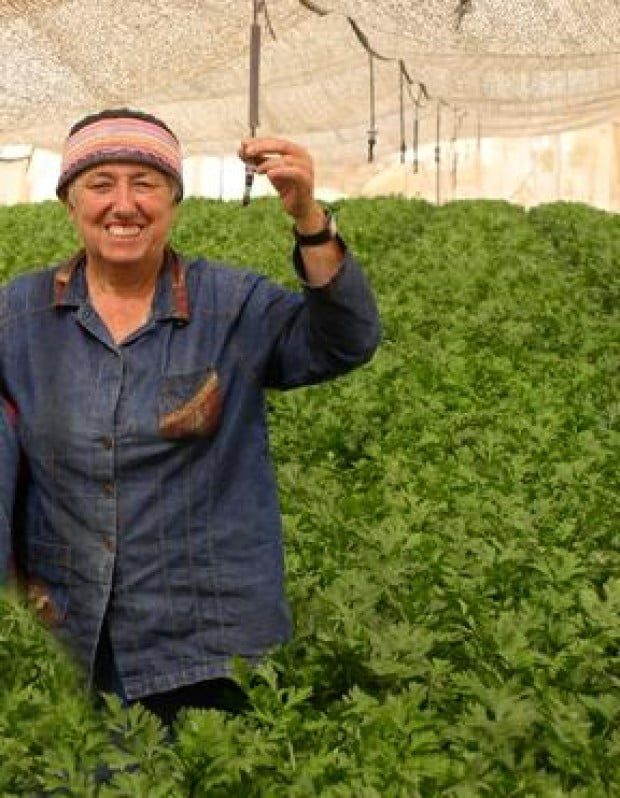
A resident of Gaza for more than 30 years, Anita Tucker and her family, along with 10,000 others, were forced from their homes when talks between Israel and Palestine broke down.
By Paul Sisolak / Special to The Malibu Times
An American resident of Israel who recently won the Moskowitz Prize for Zionism will be appearing in Malibu this week Wednesday to speak about the struggles of living in the war torn Gaza Strip.
Anita Tucker, a longtime resident of Gaza and founder of the farming village, Netzer Hazani, who was expelled from her home in 2005 by the Palestinian government, speaks Wednesday evening at Chabad of Malibu.
Tucker will tell of her a first-hand account of being victimized by the Israeli-Palestine conflict, and a message of enduring peace.
“We had wonderful relations with our Arab neighbors,” Tucker said. “Everyone was talking about ‘peace,’ but it tore everyone to pieces. People are very interested in hearing that story.”
Tucker was one of 10,000 people, and 1,700 families, forced from their Gush Katif region when peace talks between the two nations broke down. It was more than an eviction for Tucker, her husband, children and grandchildren; it was the permanent destruction of their dwellings, their memories and the past, as well as a very uncertain future. Palestinian laws ordered that all houses and buildings as part of the takeover be razed to the ground.
“The Palestinians insisted that it be destroyed,” she recalled.
For Tucker, there is no returning to the home she once knew, and for the past six years, she and her family have lived a nomadic existence, shuttling from hotel to hotel, caravilla to caravilla.
The experience for Tucker, however traumatic, hearkened back to her own parents’ strong sense of resolve in the face of displacement. Refugees from Germany and Poland, they immigrated to the United States, settling in Brooklyn. In 1969, Tucker moved to Israel with her husband, solidifying her Jewish faith, with an opportunity to start a family and plant an organic farm.
“We wanted to move to a rural place with agriculture,” she said.
Seven years later they ended up in Gaza.
“We came to this place and it was all sand dunes,” she remembered.
Thus was the start of Netzer Hazani. Like an Israeli communal compound, it was a place to go for people who kept the spirit of the sixties close at heart – a place for growth, ambition and neighborly love. The move didn’t come without some warnings from Arabian officials; according to Tucker, the last people to live in the area were Abraham and Isaac.
“They told us it was the cursed land,” she said.
But Tucker’s land flourished through a labor of love, and it ripened into a tomato farm that developed into years of abundant export across the world, not very different from the organic permaculture in Malibu, with which Tucker said she identifies. Greenhouses propelled Netzer Hazani’s commerce, with cut flowers and vegetables the dominant crops grown in the area.
“Eventually we learned how to do it,” she said. “We had a successful business and were exporting all sorts of vegetables to Europe and the U.S.”
Things would come to an abrupt and startling halt in August 2005, when Israeli officials, under orders from Palestine, forcibly ejected the residents of Netzer Hazani. Homes and greenhouses were abandoned, personal belongings left behind. Then, it was all torn down. After 30-plus years of calling it home, there was no time for Tucker and her family to cope, just to deal with what came next.
Tucker and at least other 40 farmer families were promised new land within that year by the government. Nearly five years later, there’s no sign of that happening, and it’s left them to wander, sleeping where they can, transient, staying in youth hospitals.
Part of Tucker’s visit to California is to speak on the rally of former Netzer Hazani residents to reboot, like they did in the mid-1970s, their attempts to raise funds for greenhouses and vineyards, and to rebuild a new Israel.
“We’re trying to get this done so we can start all over again,” she said. “I’m here representing my own community, telling what peace is about, not being forced to leave anywhere … and that we have to build anew.”
She continued, “We try not to be angry or against anything, but being constructive citizens again.”
Plans, she said, are to build a new community, also christened Netzer Hazani, in the Nachal Sorek area. For her involvement in this effort, Tucker was recently rewarded for her humanitarian efforts with the Moskowitz prize. During her West Coast visit, which includes a few private speaking engagements, Tucker will also appear Feb. 20 before the L.A. Zionists at the Luxe Hotel.
She empathized with the recent uprisings in Egypt, which closely mirror her own experiences.
“The situation in Egypt is so volatile,” she said. “It was really a terrible thing to see.”
Tucker has received support from local residents.
“She’s had the effect of being in the middle,” said friend Cindy Vandor of Malibu. Tucker’s drive, she said, is “not as political as she is family oriented.”
Tucker offered one sage piece of wisdom that people in Israel, Egypt, the U.S. or anywhere in world could use to great effect.
“I think it’s time that people started talking to each other,” she said. “There is a way to bring peace closer. You don’t solve a humane problem by causing a humane problem.”
Tucker will appear at the Chabad of Malibu, 22933 Pacific Coast Highway, at 7:30 p.m. Feb. 16. More information can be obtained by emailing Tucker at tucker.anita@gmail.com, or by contacting Vandor at 310.505.6491 or cdvandor@yahoo.com
